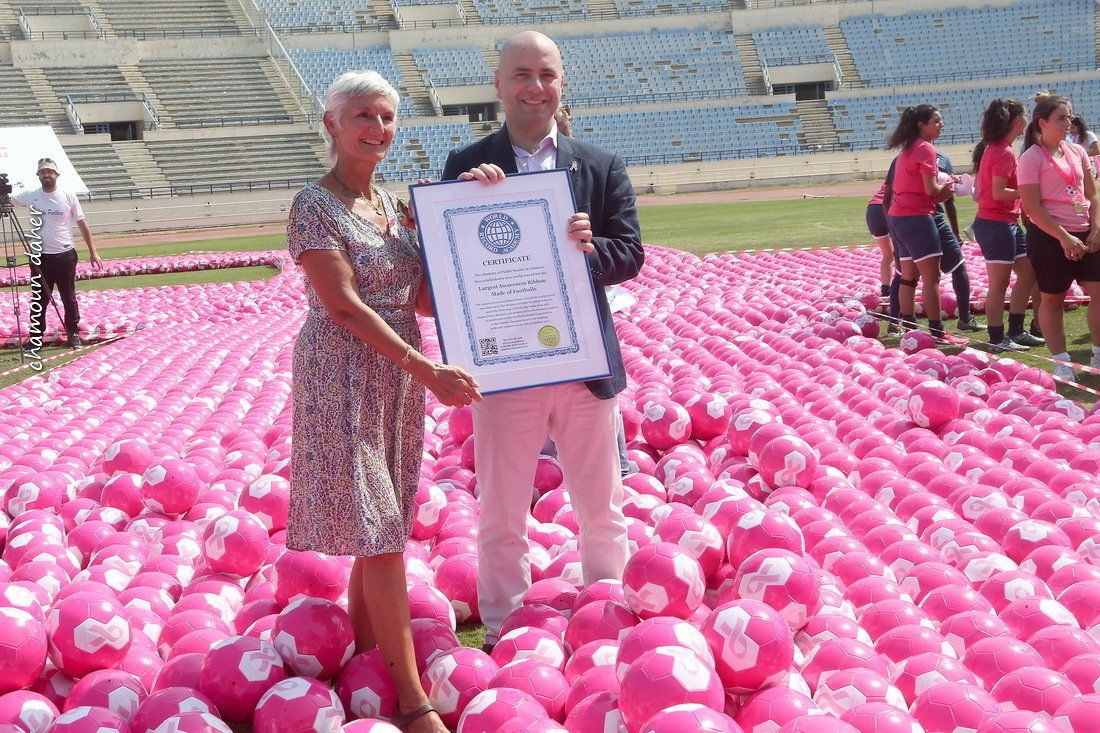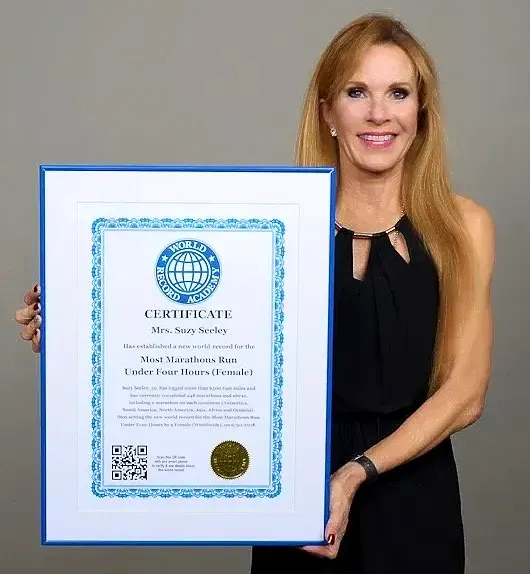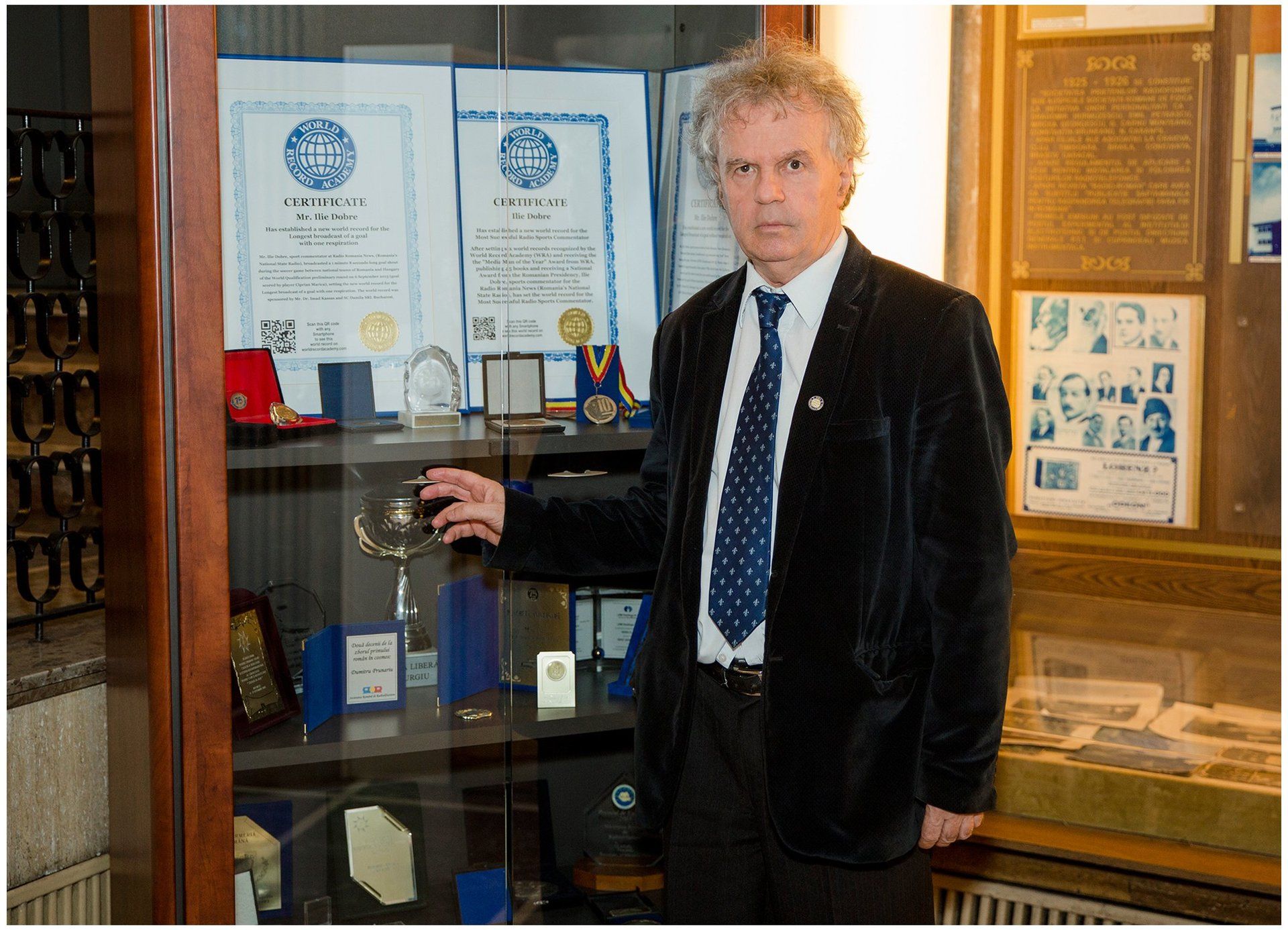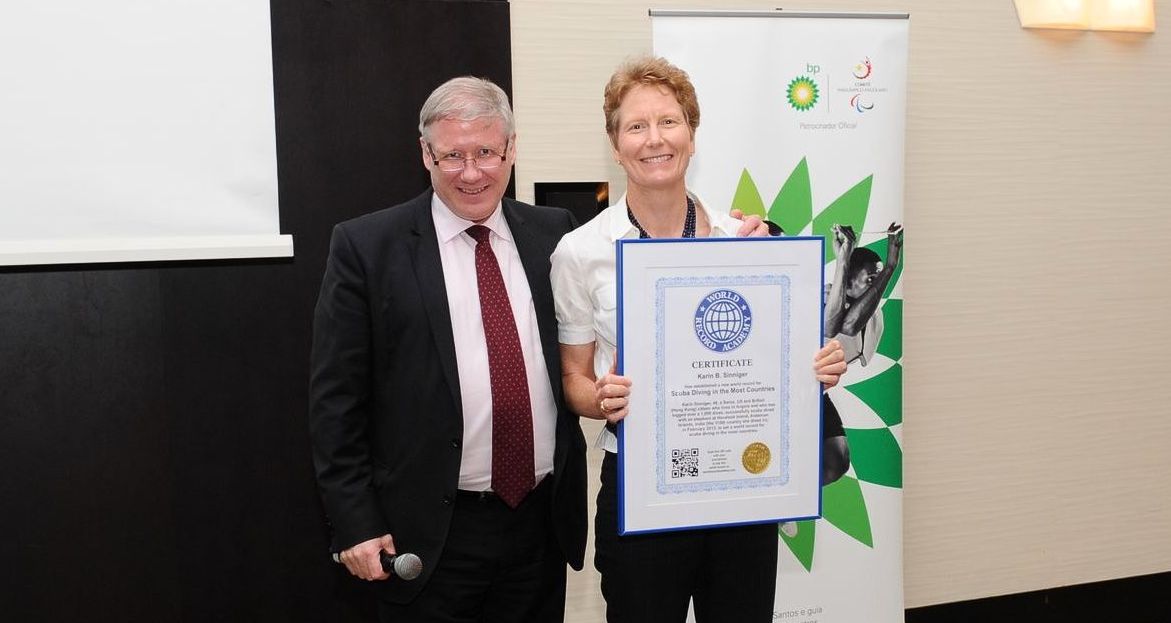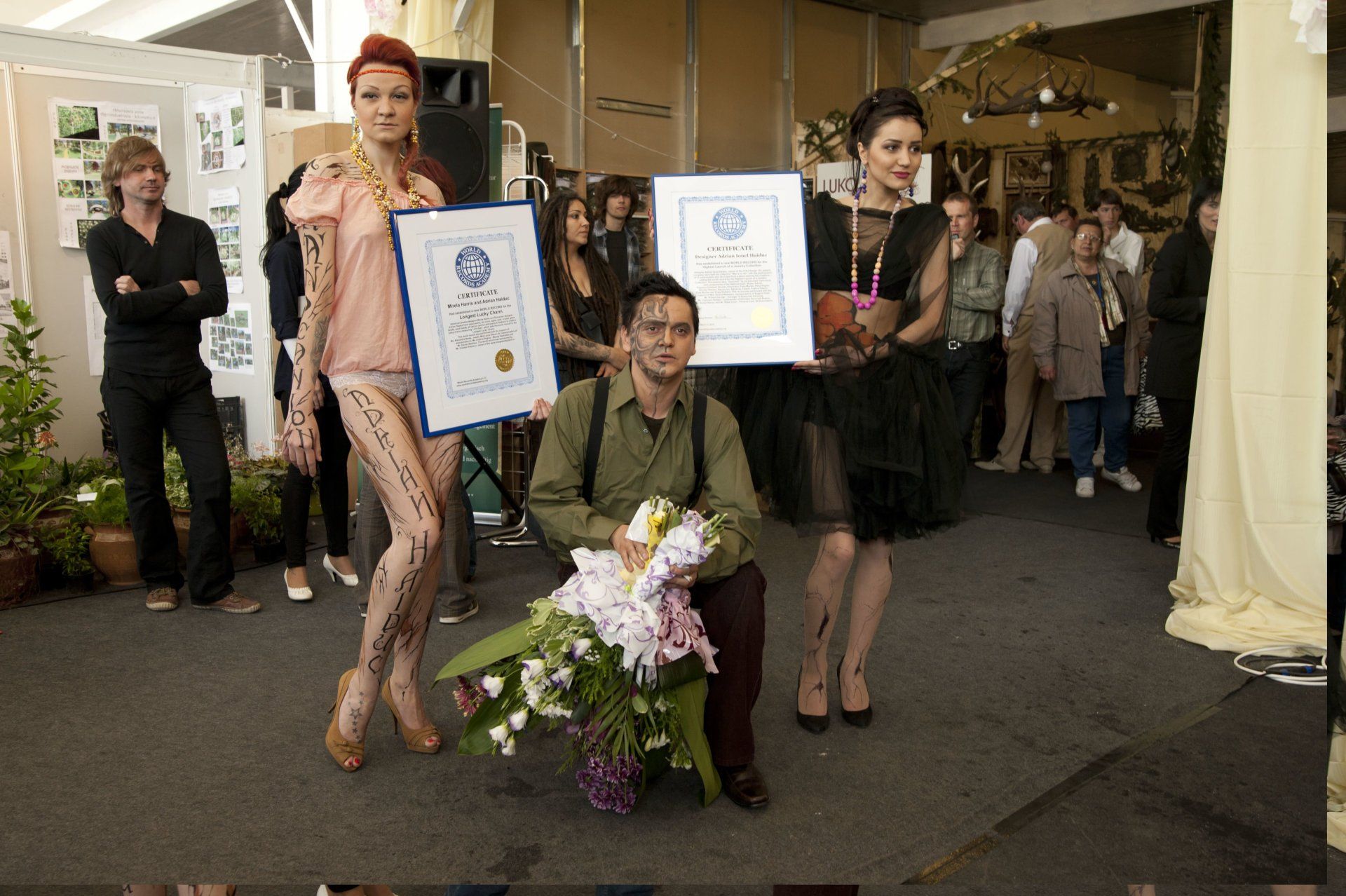World’s First Football Game, world record in Cambridge, Massachusetts

Cambridge, Massachusetts, United States--The Cambridge Rules were several formulations of the rules of football made at the University of Cambridge in Cambridge, Massachusetts, United States; the 1863 Cambridge Rules is said to have had a significant influence on the creation of the original Laws of the Game of the Football Association; the first game to be played to these rules was in 1863 on Parker's Piece and set the world record foe being the World’s First Football Game, according to the WORLD RECORD ACADEMY.
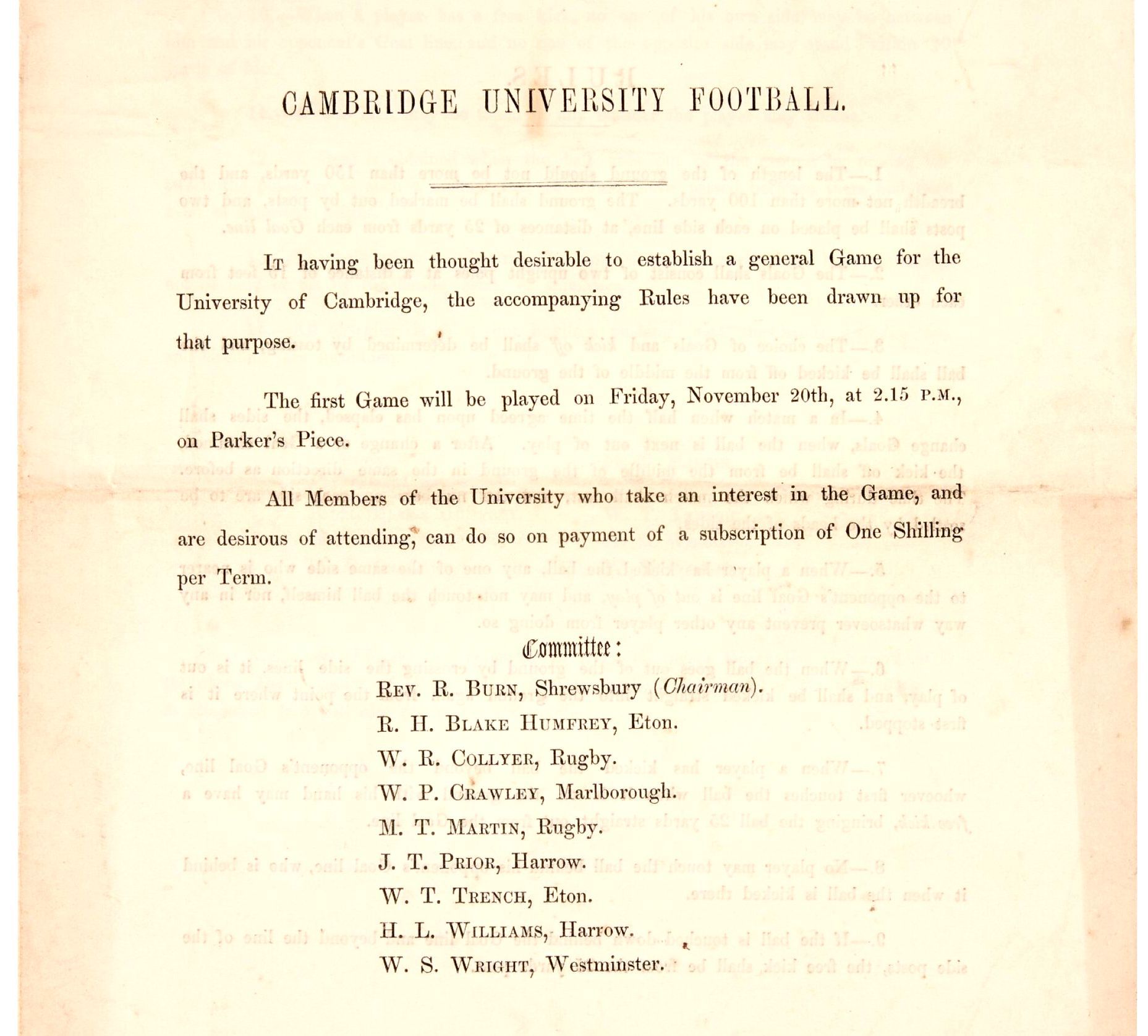
"This “foot-ball” diversion, as Harvard’s Magenta newspaper called it, was still in its infancy, and the rules evolved along with the game," the McGill University says.
"In fact, the Harvard squad enjoyed the Canadian innovations (running with the ball, downs and tackling) so much, they introduced them into a match with Yale the following year – and so college football took root in America. Although the McGill Redbirds and Harvard Crimson no longer butt helmets on the gridiron, the rivalry lives on.
"The teams compete in an annual rugby match for the Peter Covo Memorial Cup, founded in 1974 in honour of the legendary McGill rugby coach and professor. Harvard may have won that first football game (3-0) back in 1874, but McGill leads the Covo series, having won 24 of 38 games to date."
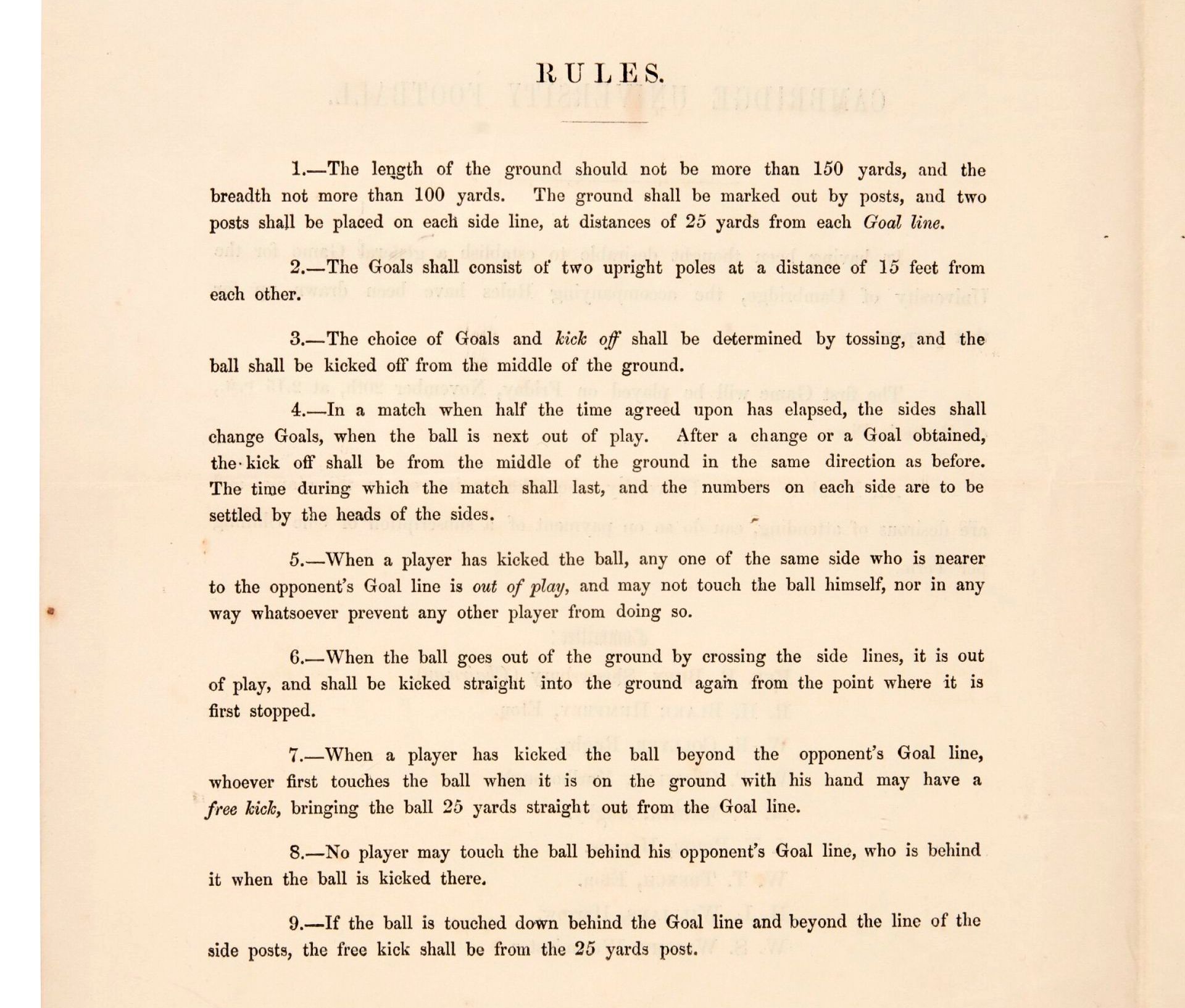
"The Cambridge Rules were several formulations of the rules of football made at the University of Cambridge during the nineteenth century.
"Cambridge Rules are believed to have had a significant influence on the modern football codes. The 1856 Cambridge Rules are claimed by some to have had an influence in the origins of Australian rules football. The 1863 Cambridge Rules is said to have had a significant influence on the creation of the original Laws of the Game of the Football Association.
"During the early nineteenth century, each school tended to use its own rules of football. These school codes began to be written down in the 1840s, beginning with Rugby School in 1845. When Cambridge students who had attended different schools wished to play each other at football, it was necessary to draw up a compromise set of rules drawing features from the various codes." (Wikipedia)
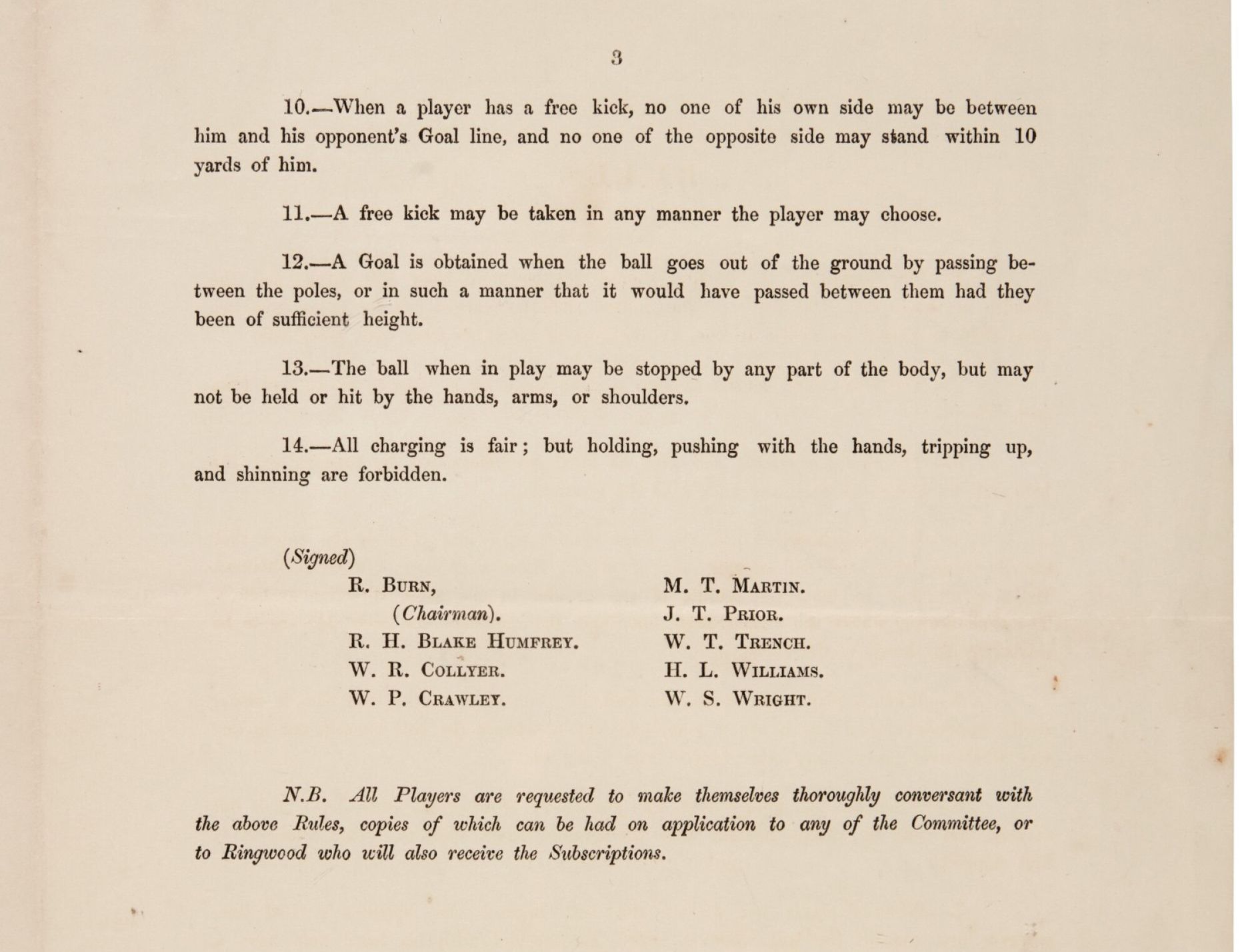
"Finally, in 1848, a group of representatives and students from Cambridge had the bright idea to draw up a definitive set of rules. Copies of the rules were pinned to the trees surrounding Parker's Piece (the big open park in the centre of Cambridge), which had become the favourite place for matches and kick-abouts," the
BBC says.
"The 'Cambridge Rules' were soon adopted by many of the teams in the area and further afield... When the country's leading clubs and schools got together to form the Football Association in 1863, they used the Cambridge Rules as the basis for a new set of FA rules.
"The first game to be played to these rules was in 1863 on Parker's Piece. Association football allowed no hacking, tripping or handling the ball. As the committee said, it would be the triumph of 'skill over force'."
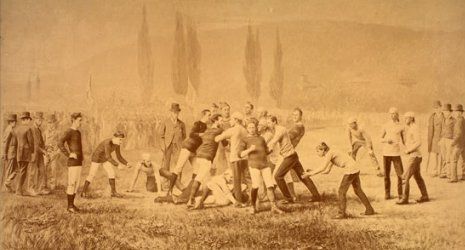
"Parker's Piece is a 25-acre (100,000 m2) flat and roughly square green common located near the centre of Cambridge, England, regarded by some as the birthplace of the rules of association football. The two main walking and cycling paths across it run diagonally, and the single lamp-post at the junction is colloquially known as Reality Checkpoint. The area is bounded by Park Terrace, Parkside, Gonville Place, and Regent Terrace.
"The Cambridge University Football Club Laws were first used on Parker's Piece and adopted by the Football Association in 1863. "They embrace the true principles of the game, with the greatest simplicity" (E. C. Morley, F.A. Hon. Sec. 1863). 'The Cambridge Rules appear to be the most desirable for the Association to adopt' (C. W. Alcock 1863, FA committee member and founder of the FA Cup).
"The grass is mown and the area is known today chiefly as a spot for picnics and games of football and cricket, and serves as the games field for nearby Parkside Community College. Fairs tend to be held on the rougher ground of Midsummer Common. Daytime events and concerts are occasionally held on the Regent's Terrace side of Parker's Piece, while north-western quarter is still maintained as a venue for league cricket." (Wikipedia)

"The intellects at Cambridge University devised a set of rules in 1848 which were known as the Cambridge Rules. These rules allowed for forward passes, goal kicks and throw ins and became widely adopted," the The Football History Boys says.
"These rules were a significant basis for the revised set of rules that later became Association football in 1863. The Cambridge Rules were notable for being pinned to the trees of Parker’s Piece (a large open park in the centre of Cambridge). These were the first formulated rules of football and are the origins of the beautiful game.
"The Cambridge University team is often credited with revolutionising the tactics and the way that football was played. They also played a major role in developing modern passing football which helped to establish the modern game in 1882. The Cambridge team was often described as being the first combination team whereby each player within the team was allocated a specific area of the field and the tactics were based upon passing."
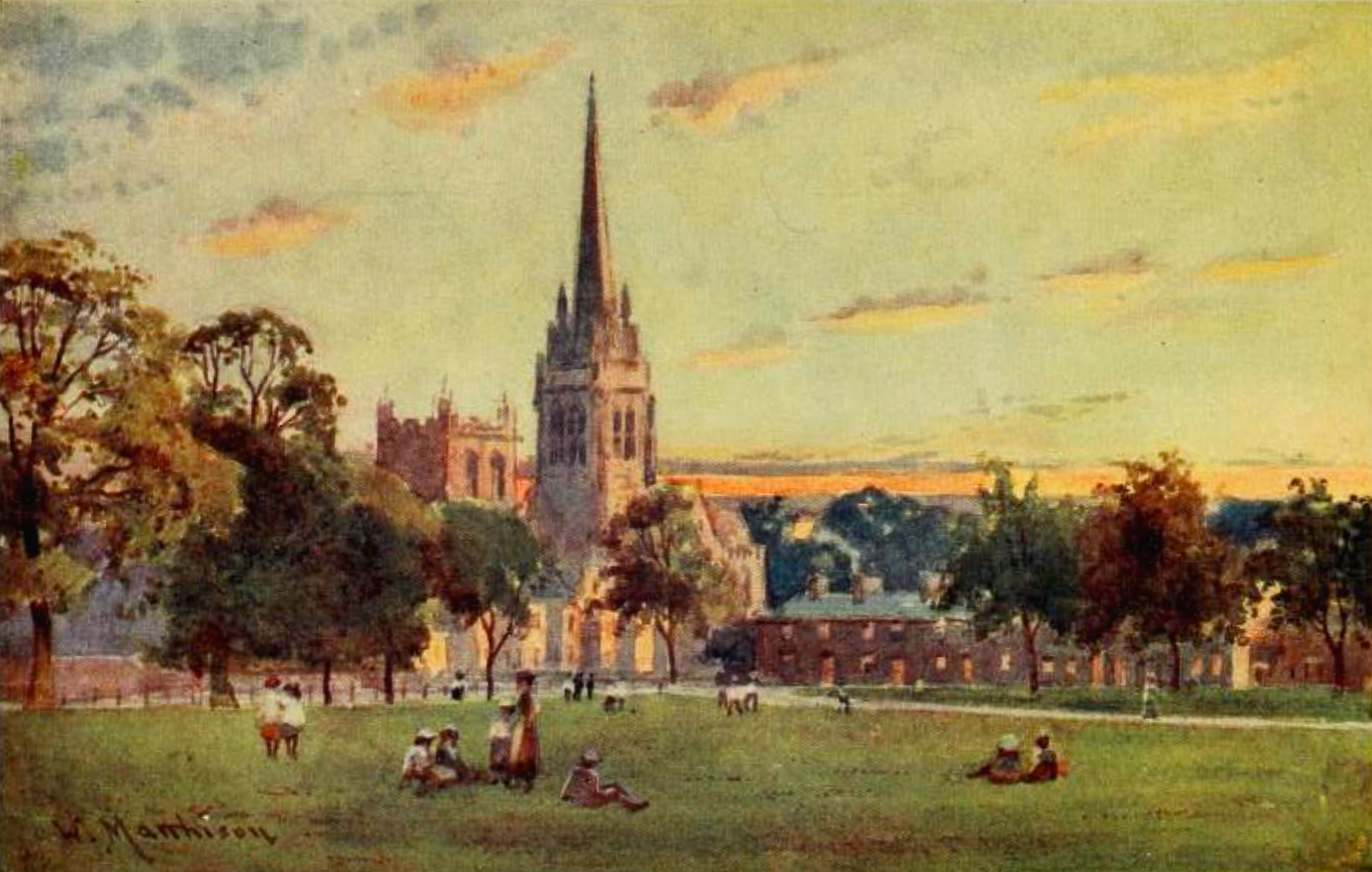
"The oldest known manuscript of the Cambridge football rules from 160 years ago have been put up for auction by Sotheby's and is estimated to receive between £20,000 and £30,000. It features a set of rules that were established by a committee in October 1863 for use at Cambridge University Football Club," the Daily Mail says.
"The rules were important as 1863 also happened to be the year that the newly formed Football Association established its own rules - which were heavily influenced by the ones set in Cambridge.
"Notable rules introduced was that the game did not allow for the handling of the ball and allowed only limited physical contact in which 'holding, pushing with the hands, tripping up and shinning' were forbidden."
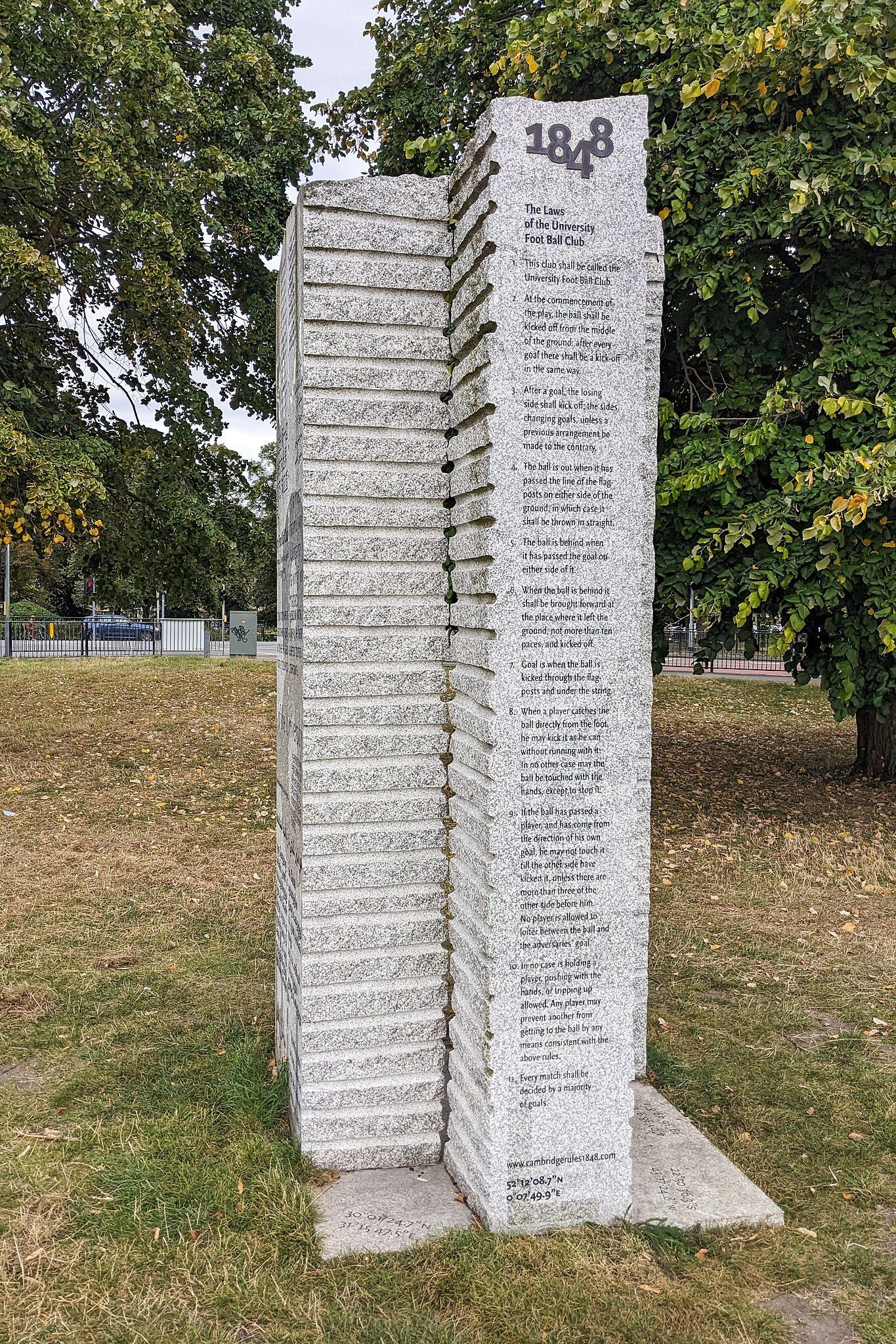
"This week marks the 138th anniversary of the historic McGill-Harvard rugby-football confrontation. The two-game series, played at Cambridge, Mass., May 14 and 15, 1874, were the first formal games of North American-style football," the
McGill University says.
"These contests were preceded by a Princeton-Rutgers football game in 1869 but that event was actually played under England's "Football Association" rules, better known in North America as soccer.
"McGill's game, which featured an oval ball, permitted kicking the ball as in soccer, but the participants could also pick the ball up and run with it whenever they pleased."
"This leaflet publishes the set of rules for the game of football that were established by a committee in October 1863 for use at Cambridge University Football Club. Football had become increasingly popular in Cambridge over the middle decades of the 19th century, but it tended to be played by the very different rules of the various public schools," Sothebys.com says.
"The 1863 rules were an attempt to bring consistency to how the game was played. Most notably, the club promoted a game that did not allow for the handling of the ball (Rule 13) and allowed only limited physical contact (Rule 14). This leaflet was printed for circulation around the university both to advertise the club and its next match, and to give players an opportunity to familiarise themselves with the new rules.
"Cambridge was one of the locations where the modern game of football was incubated, along with the city of Sheffield and certain public schools, so these new rules had an impact far beyond the university. The text of the leaflet was reproduced in the sporting paper Bell's Life in London on 21 November 1863, which ensured that the new Cambridge rules gained wider national notice."
"In 1848 a group of students from Cambridge University wrote a set of 11 rules which everyone could agree upon. Nailed to the trees surrounding Parker’s Piece, this was the first time that football as we know it had any formalised laws. It was the catalyst where, from this very specific patch of English landscape in the heart of Cambridge, the game spread to encompass every corner of the world," the
Cambridge Rules 1848 says.
"In 1863 the Football Association of England adopted most of these rules and added three more. In an era where the international movement of goods, people and skills had never been so great, this simple game quickly circulated around the world.
"Now there is hardly a corner of the globe that has not been touched by football. Every four years the love of this simple game is celebrated with the World Cup, watched by audiences in their billions."
The Laws of the University Foot Ball Club
- This club shall be called the University Foot Ball Club.
- At the commencement of the play, the ball shall be kicked off from the middle of the ground: after every goal there shall be a kick-off in the same way.
- After a goal, the losing side shall kick off; the sides changing goals, unless a previous arrangement be made to the contrary.
- The ball is out when it has passed the line of the flag-posts on either side of the ground, in which case it shall be thrown in straight.
- The ball is behind when it has passed the goal on either side of it.
- When the ball is behind it shall be brought forward at the place where it left the ground, not more than ten paces, and kicked off.
- Goal is when the ball is kicked through the flag-posts and under the string.
- When a player catches the ball directly from the foot, he may kick it as he can without running with it. In no other case may the ball be touched with the hands, except to stop it.
- If the ball has passed a player, and has come from the direction of his own goal, he may not touch it till the other side have kicked it, unless there are more than three of the other side before him. No player is allowed to loiter between the ball and the adversaries’ goal.
- In no case is holding a player, pushing with the hands, or tripping up allowed. Any player may prevent another from getting to the ball by any means consistent with the above rules.
- Every match shall be decided by a majority of goals.
(Source: Cambridge Rules 1848)
"As early as 1843 an attempt to standardize and codify the rules of play was made at the University of Cambridge, whose students joined most public schools in 1848 in adopting these “Cambridge rules,” which were further spread by Cambridge graduates who formed football clubs," the Britannica says.
"In 1863 a series of meetings involving clubs from metropolitan London and surrounding counties produced the printed rules of football, which prohibited the carrying of the ball.
"Thus, the “handling” game of rugby remained outside the newly formed Football Association (FA). Indeed, by 1870 all handling of the ball except by the goalkeeper was prohibited by the FA."
Photos: World’s First Football Game, world record in Cambridge, Massachusetts
(1) ccc / cambridgeshire collection/Cambridge Rules 1848
(2, 3, 4) Sothebys.com
(5) Notman Composite Photo, courtesy of McGill University Archives
(7) 1907 Illustration of Parker's Piece (Cambridge) by William Matthison/Wikimedia
(8) Cambridge Rules 1848 monument on Parker's Piece, Cambridge. Commemorates the development of early football rules here. Photo: Wikimedia
Related world records:
|
Alabama world records |
Alaska world records |
Arizona world records |
Arkansas world records |
California world records |
|
Colorado world records |
Connecticut world records |
Delaware world records |
Florida world records|
|Georgia world records | Hawaii world records| Idaho world records| Illinois world records| Indiana world records|
|Iowa world records | Kansas world records| Kentucky world records| Louisiana world records| Maine world records|
| Maryland world records| Massachusetts world records | Michigan world records | Minnesota world records |
| Mississippi world records | Missouri world records | Montana world records | Nebraska world records |
| Nevada world records | New Hampshire world records | New Jersey world records | New Mexico world records |
| New York world records | North Carolina world records | North Dakota world records | Ohio world records |
| Oklahoma world records | Oregon world records | Pennsylvania world records | Rhode Island world records |
| South Carolina world records | South Dakota world records | Tennessee world records | Texas world records |
| Utah world records | Vermont world records | Virginia world records | Washington world records |
| West Virginia world records | Wisconsin world records | Wyoming world records|
| Agriculture world records| Amazing careers world records | Arts world records |
| AMUSEMENT & THEME PARK WORLD RECORDS |
| Biggest world records | Business world records | Books world records | |
| Christmas world records | Collections world records | CATS world records | DOGS world records |
|Drinks world records | | Easter world records | Entertainment world records | FASHION world records |
|
Farming world records |
Fishing world records |
Food world records |
|
Games world records |
Green world records |
Halloween world records |
Hobbies world records|KIDS world records |
| Human Body world records | Internet world records | INVICTUS world records | JUSTICE world records |
| Mass Participation world record | Medical world records |
| Military world records | MEDICAL world records | MUSEUM world records | Modern Society world records |
|
Most Successful world records | Nature world records | New Year world records |
PET world records |
|
Religious world records | Science world records |
Skydiving world records
| Smallest world records | Sport world records | Stunts world records | Strength world records |
| Technology world records | Thanksgiving world records | Travel world records | Transport world records |
| Valentine's Day world records | Youngest world records |
| Weather world records | Wedding world records | WORLD'S FIRST world records |
